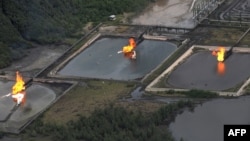Organizers of the U.N. Forum on Business and Human Rights say they seek to adopt a series of key principles to commit companies to respect the human rights of the people and the communities within which they operate. More than 1,500 participants from around the world are attending this three-day global conference, the biggest event devoted to business and human rights.
Wednesday is the 30th anniversary of the Bhopal disaster, which killed an estimated 25,000 people and injured hundreds of thousands of others.
In Nigeria, the Shell oil company has been accused of polluting the environment of local communities.
There are numerous stories of businesses' activities destroying peoples’ livelihoods and abusing the human rights of their workers. Organizers of the U.N. Forum note companies also create jobs, and deliver innovation and services that improve people’s living standards.
They say this is not an anti-business meeting. At the same time, Margaret Jungk, the vice chair of the U.N. Working Group on Business and Human Rights, says businesses have a responsibility to respect human rights and not undermine them. She says this is an important message the U.N. hopes to convey at the forum.
“In the real world there will be problems and things will go wrong and rights will be violated. But, when that happens, it is the job of everybody to put in place effective remedy," she said. "So, it is the job of governments through court systems and other means, but companies are also expected to participate in that through establishing grievance mechanisms and ways of communicating directly with the affected communities.”
Jungk says the action plan before the forum is based on a series of U.N. Guiding Principles on Business and Human Rights.
Those principles say companies have a responsibility to respect human rights and to avoid infringing the rights of others wherever they operate. And, when abuses occur, the principles state victims must have access to a remedy through judicial and non-judicial grievance mechanisms.
In 2006 Mo Ibrahim, a Sudanese-British communications entrepreneur and billionaire, established the Mo Ibrahim Foundation, which promotes leadership and governance in Africa. His foundation produces an index of governance, which ranks the performance of every African government based on a series of 133 criteria, including economics, human rights, health, education and rule of law.
Ibrahim, who is chairman of the forum, says there are companies in all parts of the world that are not doing a decent job and should be called to account.
“Take the oil and mining industry in Africa for example. A number of oil companies until now keep their contracts secret, for example, which means nobody knows who is paying what, whom…," he said. "You have the issue of illicit transfer of funds in Africa. You have the unsafe operation of some of the mines in Africa. We have the problem of illegal fishing off the coast of Africa.”
Despite the criticism targeted at some companies, U.N. officials say the business community actually is very supportive of the guiding principles and of the aim of the forum. This, they say is because businesses recognize they do not benefit when they work in an abusive environment.
Forum organizers note businesses need a stabile environment in which to operate. So, they often are the loudest in calling for the rule of law and for enforcing and upholding human rights.




